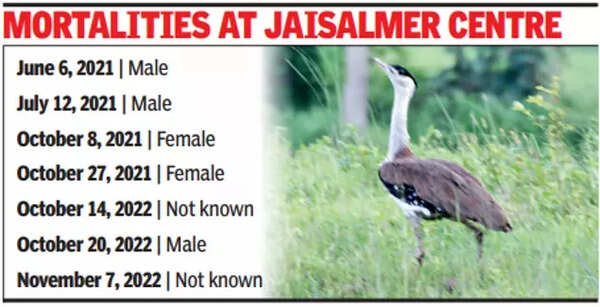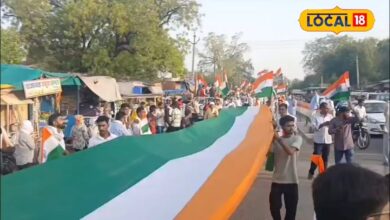Rajasthan: 3 GIBs die in 3 weeks at breeding centre in Jaisalmer, activists allege negligence | Jaipur News
The deaths occured between October 14 and November 7. With this, the total GIB deaths at the centre rose to seven in a year, a figure that’s comparatively higher than mortalities recorded in the wild.

While forest officials at the Desert National Park (DNP) claim that two birds died in October due to suspected cardiac arrest and a third, rescued from the wild, died as it was critical, environmentalists allege that the deaths may have occurred due to negligence. The programme is a joint project of the Rajasthan government and the Wildlife Institute of India (WII).
“Prima facie, it appears the birds died due to cardiac arrest. Samples were sent to the Indian Veterinary Research Institute (IVRI) in Bareilly after post-mortem to ascertain the exact cause of deaths. CCTV footage was also examined. It was found that the birds collapsed suddenly. One bird, which was rescued and brought to the centre, died as it was critical,” said deputy conservator of forests (DCF) Ashish Vyas of DNP.
150 GIBs in Rajasthan account for 95% species in world
But while the GIB deaths had continued at the centre for the past one year, forest department and WII officials have remained tight-lipped about these mortalities.
Nine GIBs were recently shifted to the newly constructed breeding centre at Ramdevra, and 15 birds are still housed in unsafe cages with small tunnels.
Environmentalists point out that in an investigation report (a copy of which is with TOI) after the death of a GIB on October 8, 2021, that the DFO had claimed the bird died due to fatal collision with the cage and allege nothing was done in this regard, so far.
The report has also observed that an adult GIB died after colliding with the cage. “The bird tried to take flight, collided head on with the cage, landed on its legs and then collapsed to death,” the report notes. The medical report of the same bird confirmed that the 698-day-old GIB had died due to traumatic brain injury.
Malsingh Jamara, ex-honorary wildlife warden, Jaisalmer, said, “It’s unfortunate that the GIBs are dying inside the breeding centre. The programme is managed by WII students as senior scientists are not paying sufficient visits to the centre. For effective monitoring, the state government should constitute a committee comprising local people and WII scientists.”
A wildlife lover, who refused to be named, said, “The WII should stop collecting eggs from the wild as it could affect the GIB population in DNP. So far, 30 GIBs have been artificially hatched from 35 eggs in the Jaisalmer park. After the deaths, 24 are surviving in captivity. The state government should also fix the accountability of recent GIB deaths and initiate an independent probe. Till date, not a single FIR has been registered.”
At the captive breeding centre, wild eggs are incubated and chicks reared in captivity. The chicks are then released into the wild.




